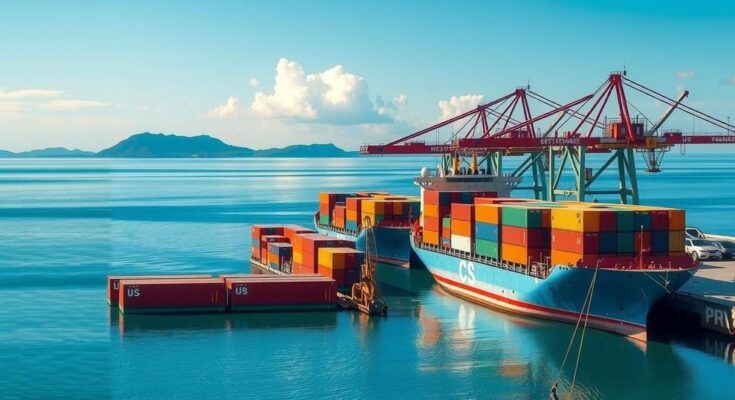Fiji could face indirect effects from the US tariffs due to its Value Added Tax (VAT), as cautioned by economist Justin Smirk. Despite the country’s minor export volume, implications of US VAT policies necessitate vigilance. Interestingly, larger tariffs may afford smaller economies like Fiji unique opportunities amidst a shifting global trade landscape, particularly in sectors facing overproduction and inflationary pressures.
As global trade braces for impacts from US President Donald Trump’s impending tariff measures, Fiji may remain an unnoticed entity due to its small size and trade volume. However, economist Justin Smirk from Westpac has indicated that Fiji could potentially be affected by these tariffs because the United States considers countries imposing Value Added Tax (VAT) on goods. Mr. Smirk stated that, despite Fiji’s minor export volumes to the US, the country should be aware of how VAT implications may attract US tariffs based on the principle of reciprocal taxation.
Mr. Smirk articulated that while Fiji’s exports to the US are relatively small and might not lead to immediate adverse effects, any country with VAT faces scrutiny under US tariff policies. He explained, “…the Americans are arguing: that’s a subsidy. You’re supporting your exports, you’re hitting our imports, we’re going to tariff you.” This perspective indicates that Fiji and other nations with VAT should prepare for potential counteracting tariffs from the US.
In discussing broader implications, Mr. Smirk noted that evolving tariff situations may unexpectedly benefit smaller economies like Fiji as global supply chains are adjusted. He suggested that as larger nations impose tariffs and attempt to reduce reliance on imports, excess goods, especially in sectors like electronics and electric vehicles, could flood international markets. This influx could help mitigate inflationary pressures caused by tariffs, thereby creating a favorable environment for smaller economies that are more open to imports.
Mr. Smirk concluded with a cautious yet optimistic stance on Fiji’s position amidst potential global trade shifts, highlighting the necessity for vigilance in light of growing US tariff considerations and the possible advantageous scenarios for smaller trade-dependent nations.
The insights shared by Mr. Smirk at the Fiji Australia Business Council event on Tuesday serve to underline the complexities of international trade dynamics, especially as they pertain to tariffs and VAT.
In summary, while Fiji may initially escape the direct consequences of US tariffs due to its small trade volume, economist Justin Smirk warns of potential ramifications linked to VAT. As nations with similar tax structures may face US tariffs, Fiji must remain alert to the evolving trade landscape. Interestingly, while tariffs can impose challenges, they may simultaneously present new opportunities for smaller economies dependent on importation.
Original Source: www.fijitimes.com.fj




